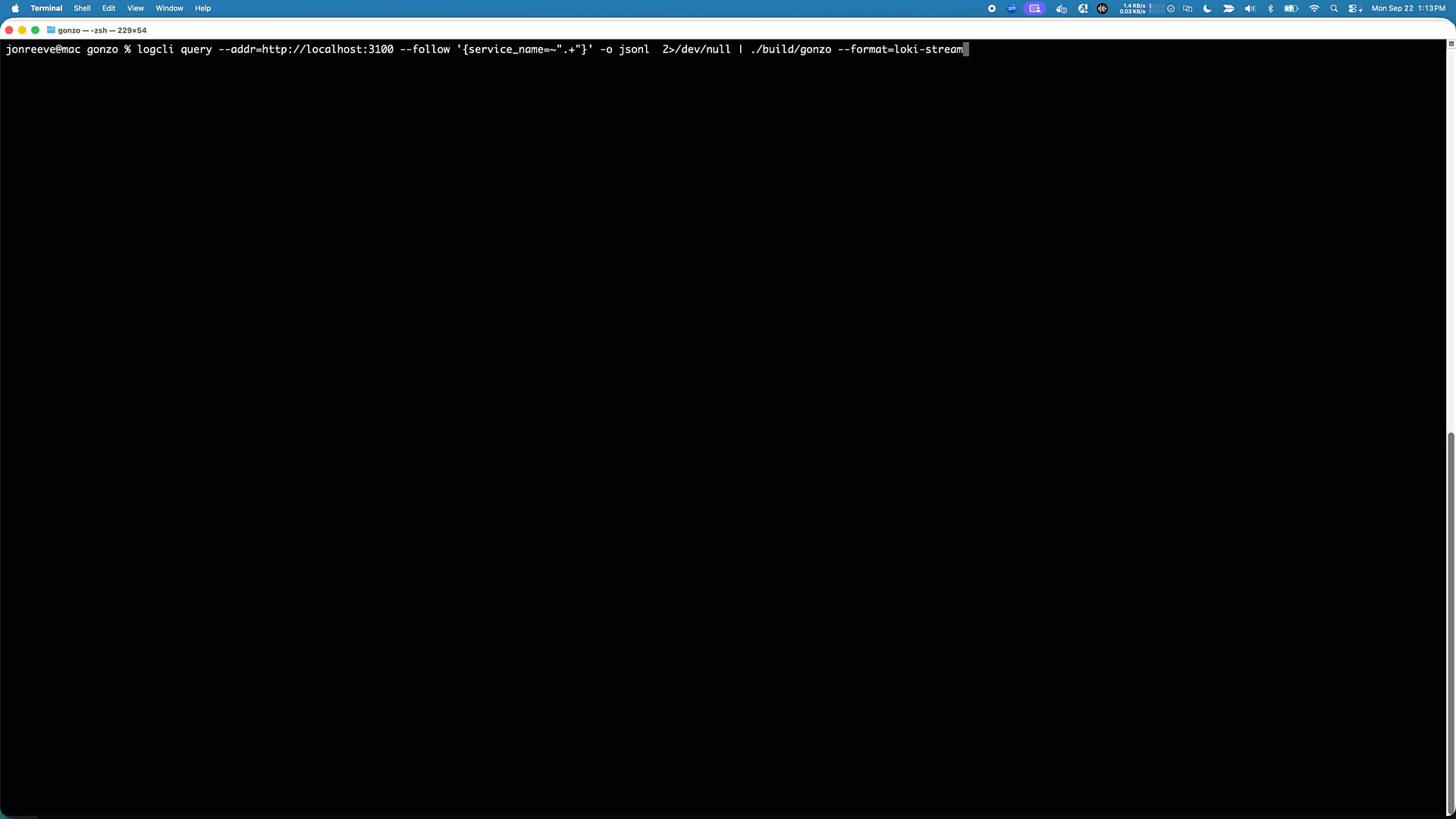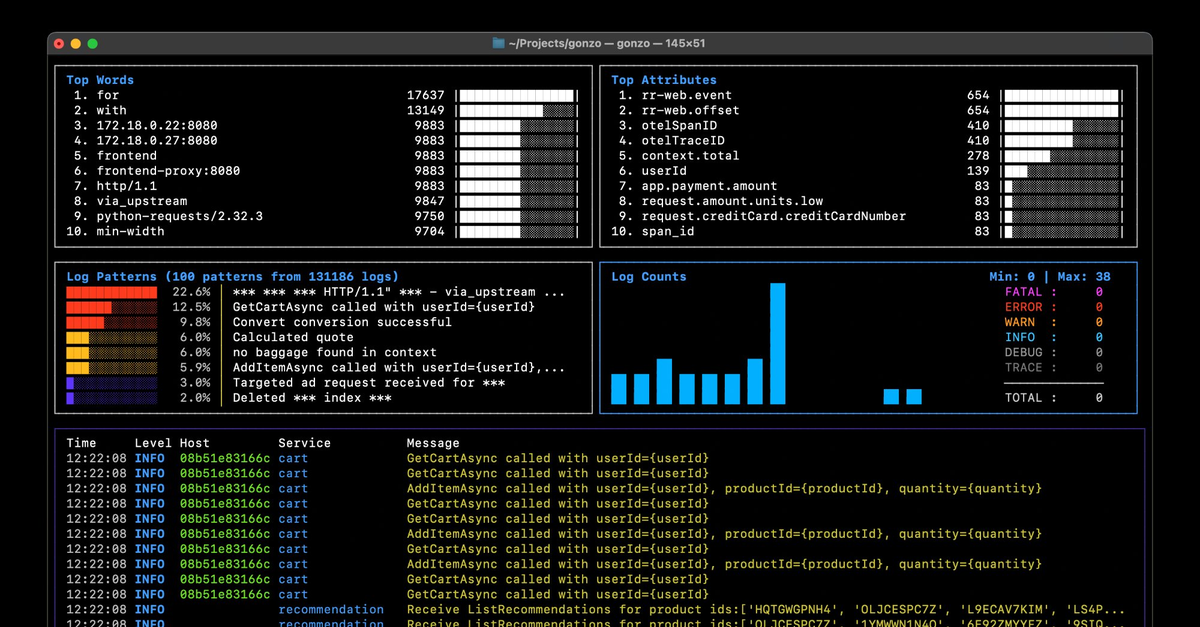
Observability teams often use Grafana Loki for centralized log storage and querying. But when you need to watch logs as they happen (i.e. Live Tailing Loki) —for debugging, troubleshooting, or monitoring—live tailing becomes essential. That’s where Gonzo comes in: an open-source, OTLP-native, terminal-based log viewer (think k9s for logs) with support for Loki’s native formats.
We recently extended Gonzo with custom formats to support Loki’s JSON output, making it easy to plug into either the logcli utility or Loki’s Live Tail API. This unlocks a powerful workflow: use Loki as your log store, and Gonzo as your real-time lens.
Why Live Tailing with Loki?
While Loki is well known for its powerful query language (LogQL) and long-term retention, live tailing has often been more difficult. Developers and SREs still need a way to:
- Debug in real time: Watch logs as code changes roll out.
- Validate pipelines: Ensure that OpenTelemetry, sidecars, or agents are shipping logs correctly into Loki.
- Shorten feedback loops: Catch issues instantly without switching between dashboards and terminals.
- Stay in-flow: Operate inside a terminal, right next to
kubectl,stern, andk9s.
By combining Loki’s live tailing with Gonzo, you can stay connected to the stream while still benefiting from Gonzo’s OTLP-native filters, search, and (optional) AI-powered assist features.
Gonzo now supports extensible log formats 🙌, and as part of that functionality, we just included two Loki JSON format examples – one that can be used with the popular logcli tool, and one that can be used with the Loki live tail API endpoint.
Option 1: Using Loki logcli
Loki ships with a CLI utility called logcli. With Gonzo’s loki-stream format, you can follow a query in real time:
logcli query --addr=http://localhost:3100 --follow '{service_name=~".+"}' -o jsonl 2>/dev/null | gonzo --format=loki-streamThis connects logcli directly to Gonzo, formatting logs for easy viewing.

Option 2: Using Loki’s Live Tail API (WebSocket)
You can also connect Gonzo directly to Loki’s Live Tail API. Using wscat:
wscat -c 'ws://localhost:3100/loki/api/v1/tail?query={service_name=~".%2B"}&limit=50' | gonzo --format=loki-batchHere, Gonzo listens on its loki-batch format to handle streaming log batches from Loki.
Try It Yourself: Quick Test with Docker Compose
Want to try this locally? Here’s a quick setup using Loki, Grafana, and the OpenTelemetry Collector.
docker-compose.yaml
version: "3.8"
services:
loki:
image: grafana/loki:latest
ports:
- "3100:3100"
command: -config.file=/etc/loki/local-config.yaml
grafana:
image: grafana/grafana:latest
ports:
- "3000:3000"
environment:
- GF_SECURITY_ADMIN_USER=admin
- GF_SECURITY_ADMIN_PASSWORD=admin
depends_on:
- loki
otel-collector:
image: otel/opentelemetry-collector:0.88.0
command: ["--config=/etc/otel-collector-config.yaml"]
volumes:
- ./otel-collector-config.yaml:/etc/otel-collector-config.yaml
depends_on:
- loki
ports:
- "4317:4317"
- "4318:4318"otel-collector-config.yaml
receivers:
otlp:
protocols:
grpc:
endpoint: 0.0.0.0:4317
http:
endpoint: 0.0.0.0:4318
processors:
batch:
exporters:
otlphttp/loki:
endpoint: <http://loki:3100/otlp>
tls:
insecure: true
service:
pipelines:
logs:
receivers: [otlp]
processors: [batch]
exporters: [otlphttp/loki]Generate Some Logs with otelgen
Once Loki and the collector are running, generate some OpenTelemetry logs using a utility like otelgen or telemetrygen, and stream them into Loki – targeting a Mac container endpoint here:
docker run --rm ghcr.io/krzko/otelgen:latest \
--otel-exporter-otlp-endpoint host.docker.internal:4317 \
--insecure logsNow tail them in real time with Gonzo:
logcli query --addr=http://localhost:3100 --follow '{service_name=~".+"}' -o jsonl 2>/dev/null | gonzo --format=loki-streamWrapping Up
With Gonzo’s new Loki JSON support, you can plug into Loki either via logcli or directly with the Live Tail API. This makes it easier to debug, validate, and monitor logs in real time—right from your terminal.
Try Gonzo today: https://github.com/control-theory/gonzo
Got other formats you’d like to see supported?, drop us an issue!
Table of Contents
Surface Unknown Unknowns Automatically
Catch emergent patterns from AI-generated code in staging—before they become production incidents.
Learn About Dstl8press@controltheory.com


 Back
Back

